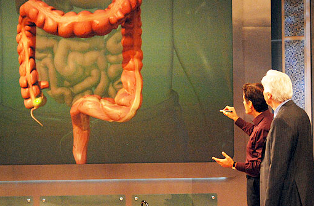September 5th, 2010 by JenniferKearneyStrouse in Better Health Network, News, Research
No Comments »

Rates of rectal cancer in those younger than 40 have been increasing, the LA Times reported recently.
Researchers studied data from the Surveillance, Epidemiology and End Results (SEER) Registry and looked at the change in rectal and colon cancer incidence in those under 40 from 1973 to 2005. Overall rates were low, but while colon cancer incidence remained constant, rectal cancer incidence increased by an average of 3.8 percent annually, the authors reported in the journal Cancer.
The authors didn’t advocate routine screening in those under 40, but did recommend that physicians be more alert to the possibility of rectal cancer in those presenting with symptoms such as rectal bleeding, according to the Times. (LA Times)

*This blog post was originally published at ACP Internist*
September 5th, 2010 by DrWes in Better Health Network, Health Policy, Opinion, True Stories
No Comments »

I received the following e-mail from a patient (paraphrased):
Dear Dr. Fisher,
Thank you for trying to switch me from lisinopril to generic losartan (Cozaar) to help me with the irritating cough that has been nagging me since I was placed on lisinopril. I did not pick up my prescription, though. At nearly $200 for a three-month supply, I’ve decided to live with the cough, since the same amount of lisinopril costs me about $12.
-Ms. Patient
Interesting how the generic drug market for some drugs only marginally discounts prices. Since the companies that make generics did not have to absorb research and development costs, how do they justify the exorbitant prices? Simple: The middlemen still have to get theirs.
-WesMusings of a cardiologist and cardiac electrophysiologist.
*This blog post was originally published at Dr. Wes*
September 5th, 2010 by Bryan Vartabedian, M.D. in Better Health Network, Health Tips, Opinion, True Stories
No Comments »

 Many times when faced with a clinical dilemma, a parent will turn to me and ask: “What would you do if this were your child?”
Many times when faced with a clinical dilemma, a parent will turn to me and ask: “What would you do if this were your child?”
When faced with this question, I never quite know what to say. And each time I feel a little on-the-spot. But why is that? Aren’t I comfortable recommending for someone else exactly what I would do for my own child? After all, what have I got to hide?
Here’s the problem: The decisions we make as parents involve our values, tolerance of risk, level of concern and frustration, prior health experience, and religious belief — to name but a few. There’s no way to fully tease those things from the parent sitting across the room. Read more »
*This blog post was originally published at 33 Charts*
September 4th, 2010 by BarbaraFicarraRN in Better Health Network, Health Tips, Opinion, Research
1 Comment »

 From Kevin Pho’s medical blog, KevinMD, a post archived from 2004, Pho talks about the struggles of communication between doctor and patient during the 15-minute office visit.
From Kevin Pho’s medical blog, KevinMD, a post archived from 2004, Pho talks about the struggles of communication between doctor and patient during the 15-minute office visit.
Pho sites a New York Times article that explains that more than two decades ago, research shows that patients were interrupted 18 seconds into explaining their problem (on average) and less than 2 percent got to finish their explanations.
Pho sites that he sometimes falls into the “interruption trap,” saying: “I think this is a natural progression to our managed care environment. Physicians are compensated by quantity of patients seen, and are kept to a strict schedule -– in most cases every 15-minutes.” Read more »
*This blog post was originally published at Health in 30*
September 3rd, 2010 by Jon LaPook, M.D. in Better Health Network, Health Tips, News, Research, True Stories
No Comments »
 Dr. Mehmet Oz just might be the last person on earth people would expect to get a colon polyp. He’s physically fit (he left me in the dust the last time we ran together), he eats a healthy diet, he doesn’t smoke, and he has no family history of colorectal cancer or colon polyps.
Dr. Mehmet Oz just might be the last person on earth people would expect to get a colon polyp. He’s physically fit (he left me in the dust the last time we ran together), he eats a healthy diet, he doesn’t smoke, and he has no family history of colorectal cancer or colon polyps.
But several weeks ago, when Mehmet had his first screening colonoscopy at age 50, I removed a small adenomatous polyp that had the potential to turn into cancer over time. Statistically, most small polyps like his don’t become cancer. But almost all colon cancers begin as benign polyps that gradually become malignant over about 10 to 15 years.
Since there’s no way of knowing which polyps will turn bad, we take them all out. The good news is there’s plenty of opportunity to prevent cancer by removing these polyps while they are still benign. But only about 63 percent of Americans between ages 50 and 75 get screened for colorectal cancer. Read more »





 Many times when faced with a clinical dilemma, a parent will turn to me and ask: “What would you do if this were your child?”
Many times when faced with a clinical dilemma, a parent will turn to me and ask: “What would you do if this were your child?”
 From Kevin Pho’s medical blog, KevinMD, a
From Kevin Pho’s medical blog, KevinMD, a  Dr. Mehmet Oz just might be the last person on earth people would expect to get a colon polyp. He’s physically fit (he left me in the dust the last time we ran together), he eats a healthy diet, he doesn’t smoke, and he has no family history of colorectal cancer or colon polyps.
Dr. Mehmet Oz just might be the last person on earth people would expect to get a colon polyp. He’s physically fit (he left me in the dust the last time we ran together), he eats a healthy diet, he doesn’t smoke, and he has no family history of colorectal cancer or colon polyps.







